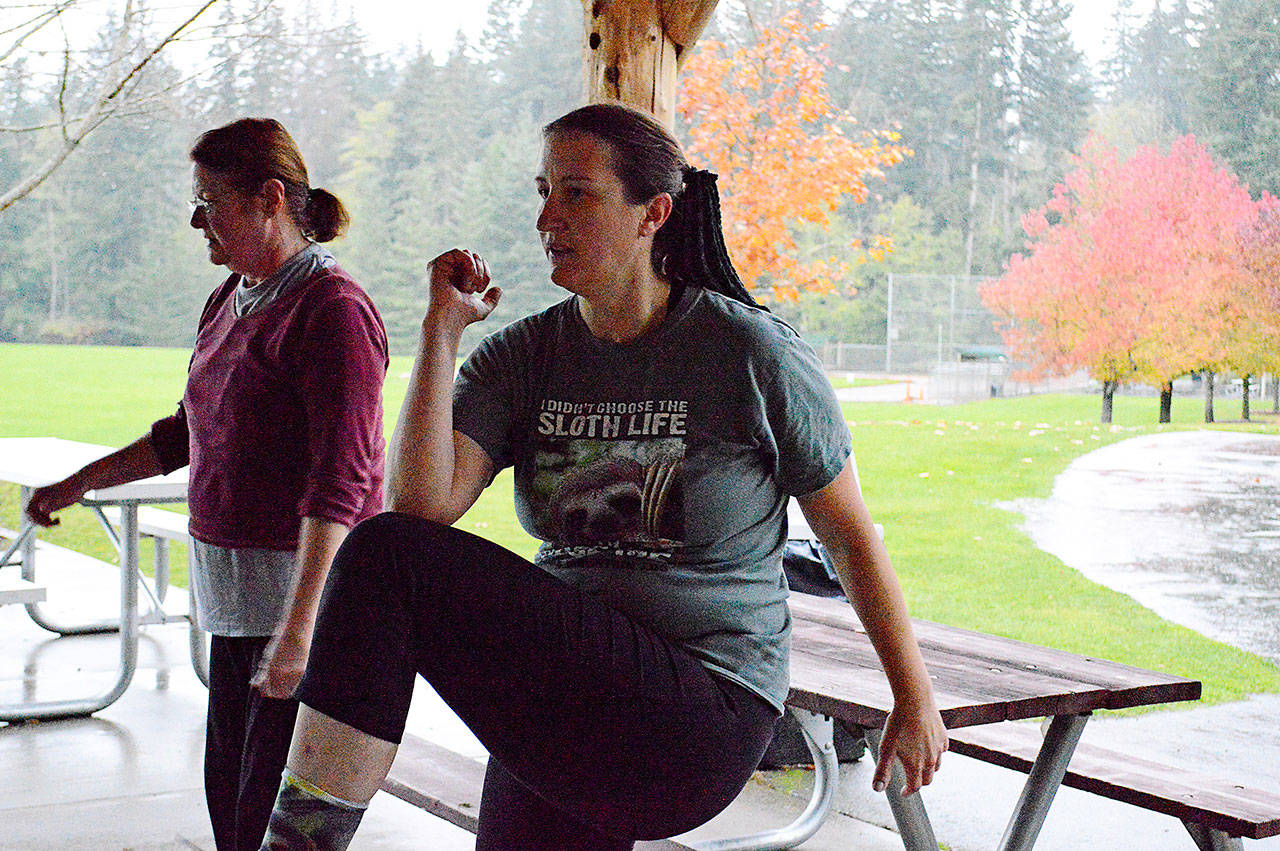Anyone can become active, even if it’s at a sloth’s pace.
The trick, according to zookeeper-turned-fitness trainer PJ Beaven, is to change one’s mindset. And Beaven has made a career of changing behaviors in this way.
Human beings are just animals, and Beaven knows how to train animals.
“If you’re not having fun, you’re not going to do it,” she said. “… That’s the gist of animal training.”
Beaven brings her “principles of zookeeping” to her class offered through South Whidbey Parks and Recreation, Sloth Army Running Club. The group’s motto is “we’re slower than a herd of sloths stampeding through peanut butter, but we run.”
Fifteen years in the field taught her that conditioning through positive reinforcement and enrichment are most effective in zookeeping. Although she doesn’t throw fish to her class members, she does reward desired behavior to make people want to exercise. And she uses games and unique —- and usually animal- themed —- exercises to make the activities more fun to add enrichment.
“The way she teaches make it easy to change your mindset about what running is,” said Alicia Alverson, a new member of the sloth army.
Alverson said she and her wife had fallen out of being active for a long time. The way that Beaven eases into fitness made it much less intimidating, she said. Beaven explained that animal trainers don’t start with the end behavior. She wouldn’t just tell a walrus to get on the scale and expect it to work, she said.
The progression of smaller steps makes both training animals and people possible. She said doing lower intensity activities that people are more likely to do consistently is more important than creating really challenging classes that many will burn out of quickly.
So for the sloth runners and walkers, speed and distance aren’t a main concern.
“At the end of it, you’re like, ‘wow, I just ran 2 miles,’” Alverson said.
Beaven began her own fitness journey in 2014 while she was working as a zookeeper at Woodland Park Zoo in Seattle. She decided she wouldn’t be able to properly take care of the animals if she wasn’t really taking care of herself.
She used her background to change her way of thinking. She avoided negative reinforcement, just like she does with animals. Instead of viewing skipping a day at the gym as a negative thing she should feel guilty about, she considered going to the gym a positive thing that she feels good about, she said.
She also started to think about the larger implications of her dietary decisions.
“What we eat has an impact on not only ourselves but our planet,” Beaven said.
She started to avoid chocolates and sweets both because they’re unhealthy and they often include palm oils, the production of which negatively impacts the rain forest.
She lost 50 pounds and felt a significant boost in her mood and energy levels. She deemed her method “zoofit,” and its success inspired her to share it with as many people as possible.
She quit her job and moved to Whidbey Island in 2016. She now works at South Island CrossFit in addition to leading her sloth army.
“I teach CrossFit for people who are scared of CrossFit,” Beaven said with a laugh.
When she started up the running club through the parks district, she chose the sloth for its famously slow pace. Even while training the animals, she said, you can’t rush them. She treats her students the same way.
A few of the women gathered for the sloth army Thursday morning said it had been a long time since they had exercised. One woman had knee issues and Beaven adapted some of the exercises to avoid aggravating them.
Although she’s now a full-time fitness trainer and author, Beaven’s background shines through in more than just her methods.
“Elephants can’t jump,” she explained to her crew as they did a sort of circuit training under the shelter at Community Park. She led them in high knees and explained how elephants have to raise their legs up really high to go over things because of their inability to jump.
The class also did “frog hops,” “dolphin jumps” and “flamenco squats.”
At the end, she told the “sloths” that if weather was bad on the next scheduled meeting day, she would cancel.
“Aw,” said Marian Myszkowski, clearly disappointed.
Alverson, a friend of her’s, looked at her in shock. Alverson explained that Myszkowski hadn’t exactly been one to bemoan missing a workout. In only a couple of weeks of class, her mentality had totally shifted, Alverson said.
“Now we look forward to it,” she said.



